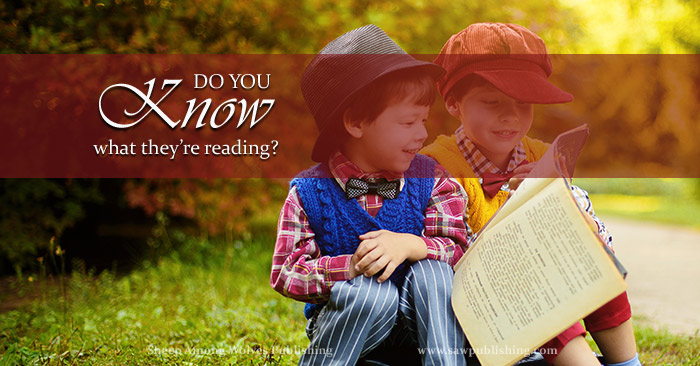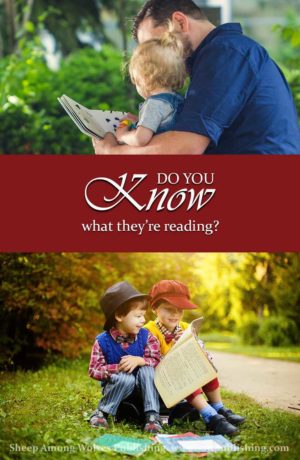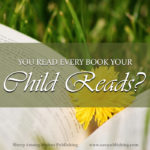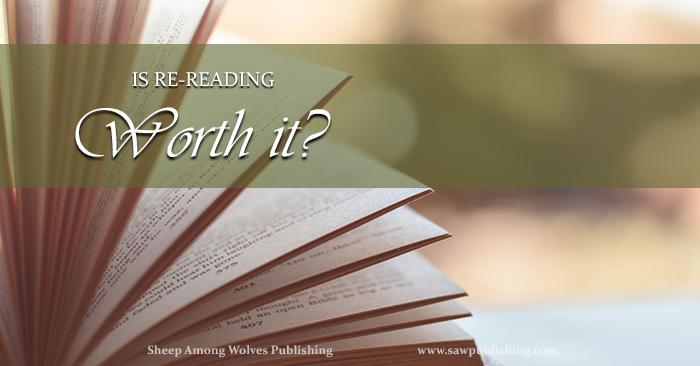Do You Know What They’re Reading?
Timeless Tips from Educators of the Past is a companion series to our Timeless Tips from Homemakers of the Past – highlighting useful and thought provoking advice from the generations of educators who have gone before us. Our goal at Sheep Among Wolves is to provide a forum for Good and Great literature, and to help you in your quest for godly, high-quality resources. It is our hope that these Timeless Tips will be an aid and encouragement to you as you strive to follow the example of Deuteronomy 6 and diligently teach your children the words of the Lord.
 Do you know what they’re reading? Should you know what they’re reading? Is it even possible to know something about every book a healthy bookworm of ten or twelve is devouring?
Do you know what they’re reading? Should you know what they’re reading? Is it even possible to know something about every book a healthy bookworm of ten or twelve is devouring?
These are questions of great importance for any parent desiring to raise up their children in a godly manner. Is it important that we should be well acquainted with our children’s literature?
Today’s Timeless Tip from Educators of the Past suggests that parents have a vital responsibility to be in touch with the material their children are reading.
Do You Know What They’re Reading?
The truth is, education takes place just as much out of school hours as in, and in consequence, the books that children read in their free hours need to be chosen just as carefully as their school curriculum—or perhaps, even more carefully.
Charlotte Mary Yonge (1823-1901), in her book, Womankind, is a strong advocate of this principle:
“Careful parents once made it a rule to let their daughters read nothing they had not read themselves. Nothing could be wiser; for not only was the quantity diminished, but moreover, much was weeded out that, though not exactly harmful, was undesirable.”
Not only does Miss Yonge acknowledge that the quantity of books your child reads will be diminished—she also seems to think this a positive!
There are a couple of different purposes which are fulfilled by this custom of pre-reading our children’s books.
Keeping Books Good and Great
When parents make it a rule to read their children’s books, they prevent much bad literature from slipping through the cracks.
“The rule is even more expedient now [1877], for the foolish notion that didactic stories must be dull has made people absolutely proud of themselves for writing a perfectly unmeaning story, or one that exalts naughtiness into a sort of heroism, and represents the authorities as tedious, hateful inflictions.”
If the author felt so at that date, before the advent of the technological age, how much more true is it today, when online bookstores and widely-used e-readers have made books of every kind even more accessible than they were then.
Keeping Your Children’s Confidence
Another thing which is just as important as this weeding out of undesirable literature, is the proactive family building which is encouraged when parents read their children’s books.
Miss Yonge goes on to state:
“I remember a mother who said of an only daughter, that up to her fourteenth or fifteenth year, she could trace whence every thought or idea the girl uttered came from; and though afterwards there might be the natural shooting beyond of the young branch, the perfect harmony and accordance were never lost between the two minds.”
Parents reading what their children read is not a kind of “spying” or “overcontrolling”—it is much more like a loving friend taking your hand and walking on a journey with you. It is experiencing something together, and growing closer in the process.
This kind of “friend” relationship is something that our society has largely lost between parents and children. Habits that foster this kind of interaction strengthen and cement the natural confidence which children and parents are intended to have in each other.
Don’t Be Ashamed to Know What They’re Reading!
 Many Christian authors will be able to identify with parents saying something like, “It’s so nice to know there won’t be anything bad in your books!”
Many Christian authors will be able to identify with parents saying something like, “It’s so nice to know there won’t be anything bad in your books!”
While this may be a tremendous encouragement—and responsibility!—for Christian authors, there is another side to the coin.
At SAW Publishing we value and strive to the utmost to be worthy of this trust, but we certainly don’t want to become a substitute for parenting. Without knowing the specific tendencies—good and bad—which each child possesses, it is impossible for even the most well-meaning, sincere author to choose exactly what is suitable reading material for someone else’s children.
God gave your children to you. We want to help you in your search for good and great books in every way we can—but we want YOU to take charge of your children’s future. We want you to read your children’s books, so that you know what they’re reading.
As always, this Timeless Tip from Educators of the Past aims at highlighting useful concepts, but is not a review or recommendation of the sources quoted. Please use personal discretion.
Wondering how you will ever keep up with your children’s appetite for literature? Take a look at our post, “Is Re-Reading Worth It?”
You might also enjoy:

Looking for more encouragement on the same topic? Margaret’s past post, You Read Every Book Your Child Reads? explores this concept in greater detail.

Our generation has been blessed with a wealth of wisdom from homemakers of past centuries. Timeless Tips from Homemakers of the Past gives you an introduction to this priceless resources.

Would you like to give your school-age children a legacy that will bless them throughout their lives? The benefits of well-written, godly literature can touch every aspect of a child’s life.

